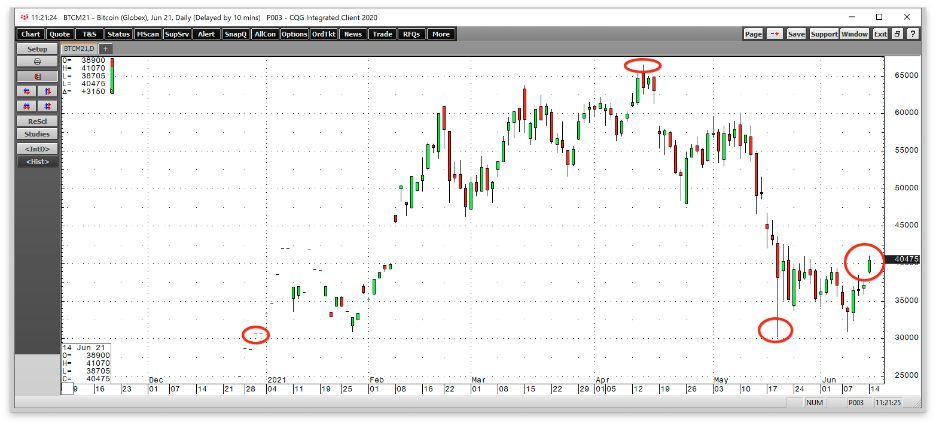This article was written exclusively for Investing.com
- El Salvador blesses Bitcoin as legal tender
- Elon Musk sings a different tune
- China is critical for Bitcoin and the crypto asset class
- It makes some sense for El Salvador and other smaller countries to move to the digital currency path, but it is dangerous
- Custody and carbon are issues, but control of the money supply is the most significant roadblock to a higher profile for cryptos
The June Bitcoin futures contract on the CME rose to an all-time high at $66,450 per token on Apr. 14, the day that Coinbase (NASDAQ:COIN) listed shares for trading on the NASDAQ. The June contract had more than doubled in value from the Dec. 31, 2020, closing level at $30,735.
Source: CQG
The chart shows the parabolic move that took Bitcoin, the leader of the cryptocurrency asset class, to an incredible high that was the culmination of a four and one-half month rally.
Elon Musk’s decision not to accept Bitcoin for Tesla's (NASDAQ:TSLA) EVs was the first blow to the cryptocurrency. However, it was China’s ban that caused a tsunami of selling. China is preparing to release its digital yuan. The second-wealthiest country worldwide likely decided that it did not want to allow for any competition to the new currency instrument. Beijing looks set to win the race among nations to release the first digital legal tender. The price dropped to a low of $30,275 on May 19, a little over one month after it reached its peak. Since then, the price has consolidated, with the bulk of the price action below the $40,000 level. After making a higher low at $30,915 on June 8, the price of the highly volatile asset was probing over the $40,000 level on June 14.
El Salvador blesses Bitcoin as legal tender
The Republic of El Salvador is the smallest country in Central America, with a population of around 6.4 million. On June 9, the day after Bitcoin reached a marginally higher low, El Salvador declared it would be the first country to make Bitcoin legal tender. The move was symbolic in a nation where over 70% of the citizens do not have bank accounts and few have access to computers.
From 1982 through 2001, El Salvador’s currency was the colon. In 2001, the then-President Francisco Flores got rid of the colon, making the US dollar legal tender. Now, the dollar and Bitcoin are the country’s means of exchange.
President Nayib Bukele’s political party has a supermajority in the legislature, making the passage of the legislation a done deal. The new law stipulates that businesses must provide the ability to conduct all transactions in Bitcoin unless they cannot acquire the necessary technology, which likely is the case for most businesses in the poor country.
The move seems more of a political snub to the US as El Salvador recently publicly thanked China for the millions of COVID-19 vaccine doses. The International Monetary Fund is not pleased with the move and has threatened to call off loans. Cryptocurrency proponents hailed the action that pushed the price of Bitcoin from below $31,000 to over $38,000 on June 10. El Salvador’s adoption of Bitcoin as legal tender will not create meaningful change for the cryptocurrency market; it was largely a symbolic move for a leader of a small country taking a stance against the financial status quo in the US and Europe. El Salvador’s President is David, throwing rocks at the powerful financial system, Goliath.
Elon Musk sings a different tune
Meanwhile, Elon Musk, who did an about-face that sent Bitcoin falling in May, switched course over the past weekend, again. Mr. Musk had said that Tesla would not accept Bitcoin as payment for his company’s EVs because of the carbon footprint of Bitcoin miners.
On Sunday, June 13, Mr. Musk said TSLA could accept Bitcoin again in the future, pushing the token’s price over the $40,000 level for the first time since May 27 and over 32% above the June 8 low. Elon Musk told the world his company would resume allowing Bitcoin transactions “when there’s confirmation of reasonable (around 50%) clean energy usage by miners with positive futures trend.” The trendsetter once again set the bar for Bitcoin’s acceptance when it comes to the cryptocurrencies’ carbon footprint.
China is critical for Bitcoin and the crypto asset class
The Chinese government publicly cracked down on Bitcoin mining in late May for environmental reasons. The Inner Mongolia region had become a mining hub. Chinese Vice Premier Liu He said it is necessary to “crackdown on Bitcoin mining and trading behavior to prevent the transmission of individual risks to the social field.” Meanwhile, Iran also banned Bitcoin mining in May until Sept. 22, after the government blamed blackouts in Tehran and other large cities on energy-intensive mining activities.
Countries with non-convertible currencies are critical to the growth of Bitcoin and other cryptocurrencies as they allow people to move money worldwide through anonymous blockchains. China’s ban was more likely motivated by the release of the digital yuan, which will compete with the cryptocurrency asset class and other world foreign exchange instruments.
It makes some sense for El Salvador and other smaller countries to move to the digital currency path, but it is dangerous
As the IMF pointed out:
“Adoption of Bitcoin as legal tender raises a number of macroeconomic, financial, and legal issues that require very careful analysis. We are following developments closely, and we’ll continue our consultations with the authorities.”
El Salvador’s decision could jeopardize its ability to receive funding from the IMF. However, the nation could be counting on the Chinese to swoop in as a savior. For China, increasing its ties in Central America is another step in expanding its global sphere of influence.
I view El Salvador’s move as more of a snub of the United States and a move towards embracing China than a wholehearted validation of Bitcoin. It could be the first step towards making the digital yuan another accepted form of legal tender in the future.
Meanwhile, for El Salvador and other countries that do not have their own currencies or have fragile foreign exchange instruments, digital currencies offer an attractive alternative. They remove the risk of substantial currency devaluation and periods of hyperinflation. However, the legislation does not solve the problem in nations where most of the population does not have bank accounts or access to computers.
The danger is the move reflects a rejection of the US and Europe and a shift towards China, with significant political ramifications.
Custody and carbon are issues, but control of the money supply is the most significant roadblock to a higher profile for cryptos
Custody and carbon remain two of the leading issues facing the digital currency asset class, but they are far less significant than the control factor.
Control of the money supply is a critical power source for governments, central banks, and monetary authorities worldwide. The cryptocurrency asset class presents a threat to that power. It was easy for El Salvador’s leader to cede control to Bitcoin as it just diluted the country’s reliance on the US through the dollar as the form of legal tender.
While many governments and central bank officials in the US, Europe, and other countries worldwide continue to point to the nefarious uses of cryptocurrencies calling for increased regulations and oversight, it masks their fear that they are a challenge to control of the money supply, a central power source.
El Salvador’s move to accept Bitcoin as legal tender may be more of a rejection of the US and Europe than an embrace of the cryptocurrency revolution. Cryptocurrencies could be a political rather than an economic tool for El Salvador and smaller countries as they seek to break status quo financial ties and establish a new future path. Expect the US and Europe to take the move seriously, which could cause Bitcoin and cryptos to become political hot potatoes.
